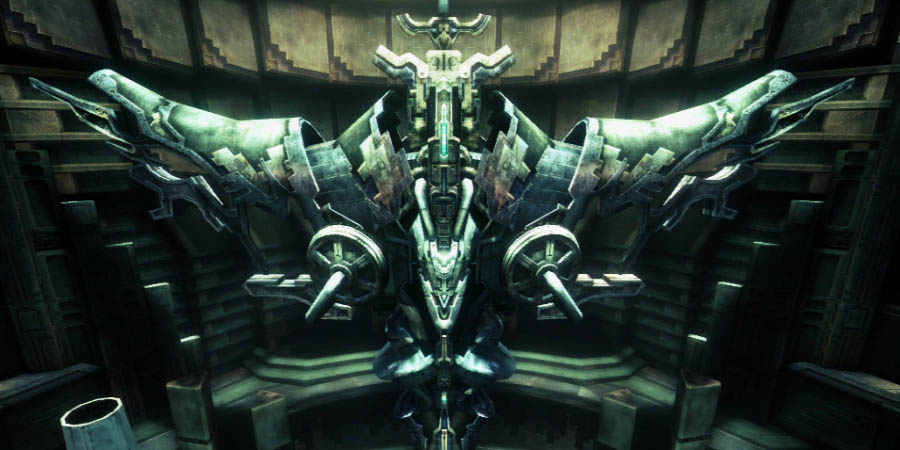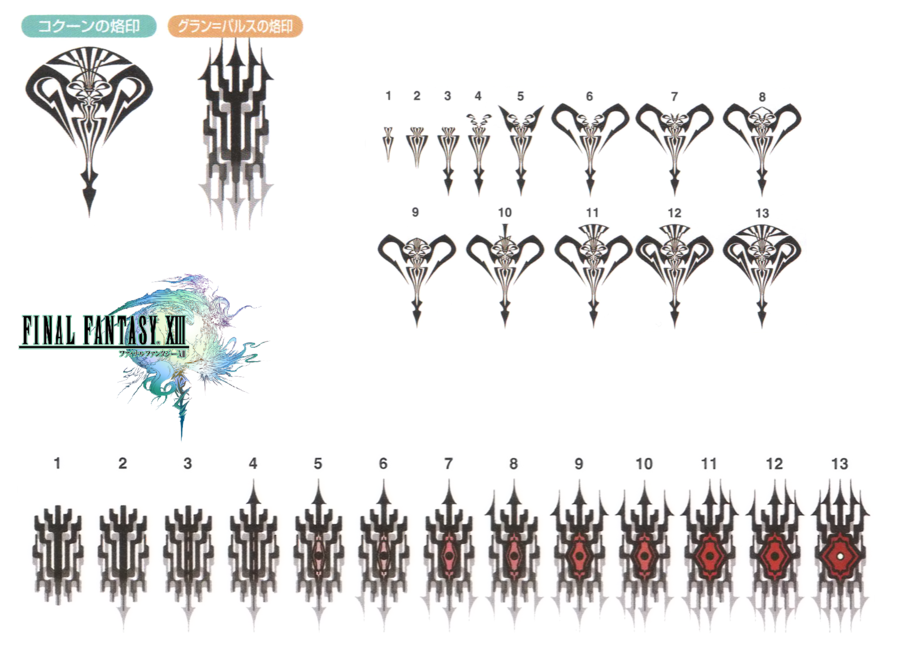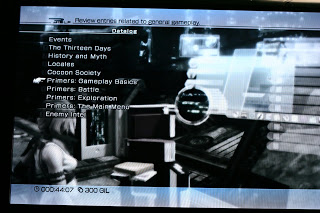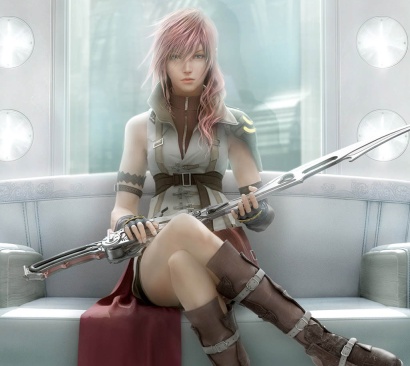Last updated on November 5, 2013
I declared the former things long ago
And they went forth from My mouth, and I proclaimed them.
Suddenly I acted, and they came to pass.– Isaiah 48:3
Final Fantasy XIII, like most JRPGs, tells a tale of fate. Unlike in most of these stories, however, the heroes and heroines of Final Fantasy XIII’s world find themselves in a conflict they didn’t start, do not intend to end, and simply don’t understand in any meaningful fashion. Yet, even though they’re thrust into extraordinary circumstances by the caprices of fate and other supernatural forces, they persevere and finish their newly created Focus, saving the world in the process.
The world of the game provides an interesting set-up: the fal’Cie, supposedly beneficient god-like being, control the workings of the planet. They give humanity the technologies they would, in our world, have to develop, test, and research: food, water, supplies, electricity. fal’Cie create a paradise of a world where humans can flourish. The original planet which humans inhabited, Gran Pulse, was a wild, untamed landscape. The fal’Cie, seeing this as an impediment to human civilization, carved a chunk out of Gran Pulse, protected it with divine barriers, and set aside a portion of the population to this new land – fittingly called ‘Cocoon”. Years of isolation have caused the citizens of Cocoon to treat Gran Pulse with paranoid notions of evil forces trying to make their way into Cocoon – a grand, Catholic Church-like government was erected, which issues an edict against contact with Gran Pulse by punishment of banishment to Gran Pulse.

Hence, the events of the beginning of the game. At its start, we find a Pulse fal’Cie making its appearance in Cocoon – military forces are sent to evacuate and/or remove citizens of that region for fear of contamination. The Purge, so called, sparks the conflict and the Resistance. The main characters, as a result of their actions, are turned into l’Cie – basically, people who have been chosen for the fal’Cie to perform a specific task, or Focus. Failing to achieve this focus will result in all of them being turned into Cie’th – terrible, zombie-like creatures with no free will who forever wander, unable to die until their flesh finally rots out. Fulfilling the Focus, on the other hand, turns them into crystal, showing the completion of their divine-mandated task. In either case, being branded a l’Cie isn’t a good thing for that individual – in fact, they have been predestined to one of two fates from the time they are branded with the l’Cie marker until they either run out of time (for it has a time limit, apparently) or they turn into Cie’th.
Not a very pleasant picture for our heroes, huh?

Lighting, seeing her sister (and Snow’s fiancee) turning into crystal, attacks the Pulse fal’Cie Anima. In response, he turns them all into l’Cie, which starts us off on the grand adventure to figure out just what their shared vision was. Of course, there’s a whole lot of deus ex machina in getting the six protagonists into the same picture, but that’s natural when we enter a new world like this: things must be explained, and even if not explained they must make sense in this world’s metaphysical structure. Which, as I’ve demonstrated, they do.
Interestingly, and this is an excellent narrative trope, they don’t understand what they’re task actually IS. Are they supposed to destroy Cocoon, seeing as their mark came from a Pulse fal’Cie? This causes disagreements in the party, which forces them to split up. Fundamentally, then, the whole plot consists of these people trying to find out what exactly they’re supposed to do. Sometimes, they draw away from their fate, as in the case of Lightning and Hope. Both of them wish to forget the past, but find themselves moving further and further from their goal by focusing (har) on a different, unrelated objective. Other characters find their loved ones turned into l’Cie, or even find that they are continually discovering what the will of these gods actually ARE. It’s a mystery to the characters, and a mystery to the audience – a perfect setting.
I imagine, from my perspective, that this is why we have the Datalog – it’s the Wikipedia of Final Fatnasy XIII, revealing the various parts of the world and its metaphysical structure. Do you need this information? Absolutely not! In fact, I’d say the story as a whole works much better when you’re just blindly, and unknowingly, exploring a new world (if excessively linear like a tunnel) – you’re meant to relate to the protagonists in this way.

It’s expecially effective when you find that the seemingly benevolent “gods” of Cocoon aren’t helping in all – in fact, the leader of the Cocoon fal’Cie, Barthandelus, actually wants to destroy Cocoon AND Pulse, as well as all of its human life, so that they can bring back the Maker. Orphan, which was the vision seen at the beginning of the game, actually powers all the Cocoon fal’Cie – by killing it (not going to bother guessing genders), they can open the Door of Souls and reunite with the Makers. Though not well explained in the context of the game, the Maker (or Makers – it’s definitely possible that there are two) are those that created Gran Pulse and Cocoon – after doing so, they left through the Door of Souls, never to return unless needed again. They set the fal’Cie in motion to keep the planets stable and prosperous, and left it to its own devices. If Final Fantasy XIII doesn’t promote deism, it sure feels like it. It also sounds a LOT like Sephiroth killing the planet to make himself a god. Yes, FFXIII cribs liberally from FFVII, but I imagine you would too if you had such a successful property.
I just explained this, but I did not know much of that was happening while PLAYING the game. That’s the essential point – you’re not supposed to get the story at first glance. Perhaps it’s the incompetence of the developers or their desire to confuse the player, but the structure of the world hasn’t been explained in any full way during the game. Rather, the characters need to understand themselves and their fate. Their entire lives, from the beginning to the end, is under the control of a bunch of gods who don’t see the value in human life. We see it, of course; the characters all develop and change in subtle ways through the narrative. At first, they lament and argue about their fate, but eventually accept their faults and failures. In turn, they find the strength to resist their fate AND resist the will of the Cocoon fal’Cie, inevitably causing the destruction of Cocoon, but not the human race. Their objectives change – Lightning wants her sister back, Sazh wants his son – but their reasoning changes.
I’m not crying for the re-evaluation of the DEPTH and MEANING of said plot – it’s poorly told, all in all – but I found a charm in the game that most people did not. There’s a subtle undercurrent of battling fate, even as you unintentionally fulfill it. If there was a better example of this, it’s Jonah, although one gets a completely different message from there. In it, God forces Jonah to minister in Ninevah, precisely to save them from their own sinfulness. Jonah, however, doesn’t want to do that – he finds every method in his power to avoid this fate, yet God brings him back to it – he places him in a giant fish and brings him their against his own will. Unlike the gods of Cocoon, God wants to save rather than destroy – the destruction only occurs if the people fail to repent. Ninevah redeems itself almost immediately – the long suffering God of Israel does not enact His rightful judgement in the face of true repentance.
God does what He proclaims, and nothing different. He sets the rules, He makes the story, and He includes us in the action. Frankly, that’s pretty darn cool. So why do we continually reject our role, instead lamenting “Why, God, did you make me do this”, or seeing everything as a personal slight, or seeing one’s own current task as useless or insignificant? And what does Final Fantasy XIII have to do with it?

